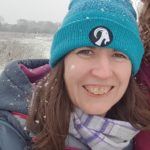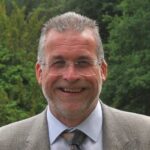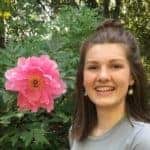Profile
Yueng Lenn
-
About Me:
At work, I’m a physical oceanographer who explores the physics which is responsible for ocean circulation and mixing that can impact sea ice and our atmosphere. And I also lecture university students on oceanography.
-
Read more
I grew up in Singapore and live there till I came to university in the UK. After a few more moves between countries (back to Singapore, then California, USA) and universities, I now live in Chester with my family.
I grew to love the sea on my many beach holidays as a child and have always loved being in the water. I guess it won’t surprise anyone to learn that my favourite form of exercise is swimming, preferably in the sea, but I’ll take a pool as well. That’s probably just as well, because Chester doesn’t have any sea side, so I have to go to work to get salty. Actually today, I’ve been swimming down the River Dee with my family which is fun, but also really my only chance to swim during the coronavirus pandemic.
We are currently between pets, apart from the stick insects, and are trying to decide if we will get another bearded dragon or aim for a tortoise instead. We are a reptile and amphibian family, rather than furry pet family.
-
Read more
As a university lecturer, I spend a lot of time giving lectures to large groups of students. My biggest lecture group is about 450 students at once, but the class sizes vary a lot from module to module and I sometimes have classes as small as just 4 students. I teach the students about our oceans and what they do for us, how we make measurements of them and what ocean physics has to do with our climate.
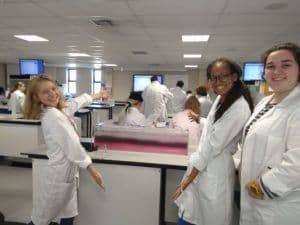
First year undergraduate students showing off their beautiful experiment.
As a scientist, specifically a physical oceanographer, I use measurements of the ocean’s temperature, saltiness and currents to understand how our oceans move heat and salt and nutrients around the planet. My interest is in the polar regions, where the ocean is an important source of heat for the environment. I’ve been looking at how heat from the ocean can reach the sea ice to melt it and thinking about what happens if it does. At the moment, researchers from my project are on an icebreaker that will freeze itself into the Arctic sea ice to continue a year-long drift across the Arctic Ocean. Going to sea is definitely one of the best parts of my job, but these days, I am at sea teaching more often than on big science expeditions!
University lecturers don’t just teach and do research, we also each share out the other jobs that keep our departments ticking over. My other main responsibility is to organise visits to our department, or sending staff out to visit schools. This is another fun part of my job as I get to do fun little science experiments with school children who have never thought what ocean sciences before.
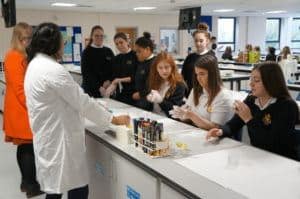
Teaching visiting school children about luminescence.
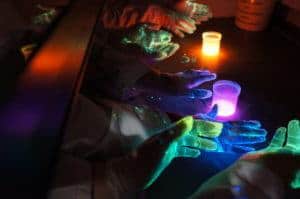
Exploring luminescence using glow sticks. Students were then challenged to mix the colors together to get white light. Reverse engineering a rainbow
-
My Typical Day:
I often get up in time to catch the 7.20AM train to Bangor. When I get to Bangor, my work can vary between heading into a lecture theatre or laboratory to teach a class or practical, or heading into the office for a meeting with students or other staff, or maybe squeeze some research in between classes, or heading out onto Bangor’s research ship to take our students out to sea.
-
Read more
I can’t say what a typical day is like for me, because like most scientists, it really varies a great deal from day to day and week to week. As far as my teaching is concerned, the way we share teaching of each subject at Bangor, I don’t even have a timetable that is the same every week like school children do.
During term time, the work day is dominated by teaching and teaching-type tasks, like writing a new lecture or marking homework or meeting with students. So a 9.00 AM lecture could be followed by an hour of preparing for the next lecture at 11.00 Am
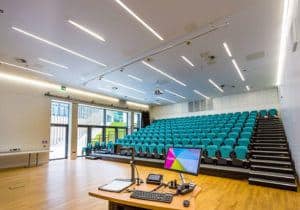 , followed by meeting a student to talk about their research project at noon. After a break for lunch at 1pm, I’m might be found back in the office having meeting with my postdoctoral researcher about their new results or the travel arrangements for them to join an upcoming research cruise. This will leave me with about an hour or two before I have to catch my train home to get going on some study of my own, or writing up results into a new science report. On the train on the way home, I might catch up on some marking or maybe read a new science report than someone else has published or is trying to publish.
, followed by meeting a student to talk about their research project at noon. After a break for lunch at 1pm, I’m might be found back in the office having meeting with my postdoctoral researcher about their new results or the travel arrangements for them to join an upcoming research cruise. This will leave me with about an hour or two before I have to catch my train home to get going on some study of my own, or writing up results into a new science report. On the train on the way home, I might catch up on some marking or maybe read a new science report than someone else has published or is trying to publish.Outside term time and the exam period, there’s fewer teaching tasks. So apart from a morning meeting with a student about their summer research projects, I am most likely to be found in my office, either in Bangor or working from home. Here I’ll be pursuing research of my own, which is looking at ocean measurements and working out what they mean. At the moment, I’m have also been making plans to get funding to do more research which means reading more science reports and talking with the other scientists I’m planning the project with. I will probably also make time for some writing too. This year, together with 3 other scientists, I am writing chapter about the Arctic Ocean for a textbook.
If I am at sea on a scientific expedition, then my day will be organized around the specific measurements I’m responsible for. What time I wake up very much depends on what shift I am working. At sea, we work in shift through the 24 hours, because we don’t want to lose any time we have to make measurements. So we often have 8 hour-shifts and so no one has free time only at night, the shifts are often go from 4 am to noon, noon to 8 pm and 8 pm to 4 am. When I worked a 4 am to noon shift, I’d get up at 3.40 am, wash my face and teeth , get dressed and grab a quick drink before heading into the science lab where I’d catch up with people finishing up their shift. Then I’d make sure the scientific instruments I’m in charge of have had their data downloaded and are set up and ready to go for the next measurement. On board, we tend to sail from station to station where we lower our instruments into the water to take new measurements. So we will do this all day and all night. During my shift, I make sure the instruments are working properly, and in between stations I’ll be looking at the data to make sure it is good and also to see what it’s telling us about the ocean, apart from breaks for mealtimes. After my shift ends at noon, I’ll probably make time for some exercise, and maybe do some reading or watch a movie with other off-shift people for another few hours. But I will definitely want to be back in bed by 8pm! So I can get up again at 3.40am!
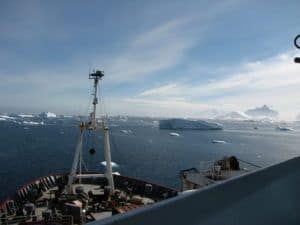
Research cruises to the Antarctic or Arctic always means ice!
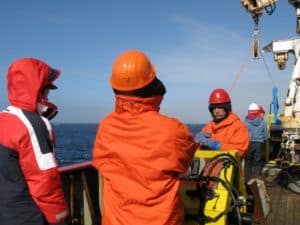
Taking some measurements is very labour intensive. this instrument takes 3 people on deck to deploy and another in the lab.
-
Education:
I went to school in Singapore at the Methodist Girls School through my primary and pre-A level years.
I attended the Anglo-Chinese Junior College for sixth form.
Next I got a physics degree at Corpus Christi College, Cambridge.\
Followed by a Masters of Science degree in radiation physics at University College London
Then I went onto Scripps Insitution of Oceanography, University fo California, San Diego for my PhD. -
Qualifications:
O Levels; Maths, English, Chinese, Physics, Chemistry, Biology, Geography
A Levels: Maths, Further Maths, Physics, Chemistry
M.A.: Experimental and Theoretical Physics.
MSc: Radiation Physics – Medical Applications
PhD: Physical Oceanography -
Work History:
Pre-1999: Before graduating from university, I worked as substitute teacher a few times at high school level (several months, summers, fun but hard work), a lab technician (most fun, because I had 3 mates also doing this very easy job!), and data entry person (I was awful, lasted two days).
1999-2000: Laser physicist, National Cancer Center in Singapore for a year and a half.
2000-2006: Graduate Student Researcher, Scripps Institution of Oceanography
2006-2007: Postdoctoral researcher, Scripps Institution of Oceanography
2007-2009: Postdoctoral researcher, Bangor University, Wales
2009-2014: NERC Postdoctoral Fellow, Bangor University, Wales
2015-now: Lecturer to Reader, Bangor University, Wales -
My Interview
-
How would you describe yourself in 3 words?
woman, oceanographer, swimmer
What did you want to be after you left school?
I never had a really clear idea, but thought I might end up teaching. And so I did!
Were you ever in trouble at school?
yes - I was much too outspoken for a quiet Singapore classroom
Who is your favourite singer or band?
It varies, sometimes I like pop, sometimes I prefer a more alternative sound like Laura Mvula
What's your favourite food?
Definitely noodles of all kinds.
If you had 3 wishes for yourself what would they be? - be honest!
Do excellent research that makes the world better, raise my children well, eat really really tasty food.
Tell us a joke.
What did Cinderella wear into the ocean? ... Glass flippers!
-



